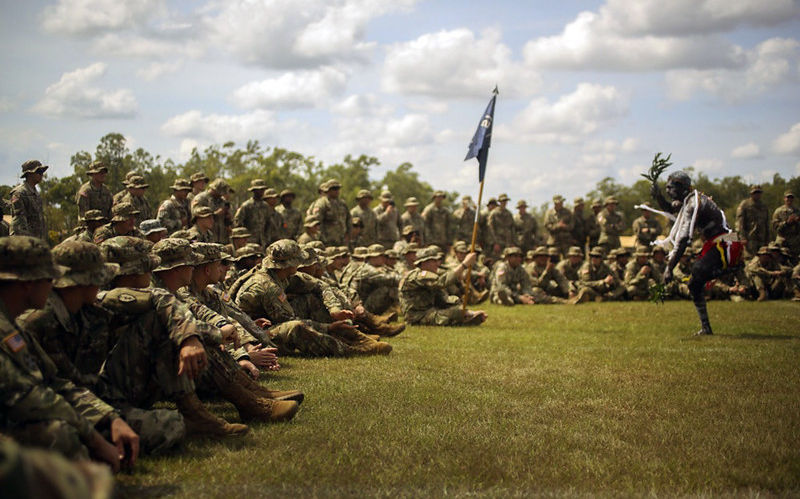Once defence ministers spending fiction and the big sell-out
January 3, 2023
Americas confected strategy to contain China for its own ends has to be separated from Australias self-reliant defence, with clarity. The Strategic Defence Review must staunch the bleeding.
Its too easy to mislead Australians on their security. Kim Beazley, a former ALP Defence Minister, was at home when addressing the Ramsay Centre in Sydney last November, calling for increased spending on defence. The Ramsay Centre was created philanthropically for the study of western civilisation. Former prime minister John Howard is chairman, with another past leader Tony Abbott a director.
Beazley claims that had Defence spending been maintained at the level when he was Minister (1984-90), annual budgets since would have been between $8bn to $18bn greater (depending on assumptions). By inference this is the rightful spending entitlement for Defence, given a continuing policy objective of self-reliance in defending Australia. Beazley would have Defence consuming an additional $240 bn to $540 bn of taxpayers funds in the thirty years since he set the standard. Meaning the current Defence budget would be $56 $66 billion instead of $48 billion. Of course, this is an input-only argument saying nothing of outcomes foregone, nor their utility.
The closest Beazley came to addressing outputs was in lamenting the Navy since his time.
I remember with the Navy in particular, we planned for 17 warships. … We were four ships short. That’s what we figured we’d need. I failed to get eight submarines, … I only got six, and it all relates to the choke points of entry into Australian home waters. There’s four of them through the Archipelago, so we needed to be able to put those sorts of ships and submarines in that area permanently if a conflict were to ensue. We never got anywhere near the 17."
No awareness that technology has rendered surface ships at once more effective and more vulnerable, depending on what they are doing. If Beazley had thought beyond his beloved Navy to land-based aircraft, the contrast in mobility would surely have touched a grey cell. Ignored also are the staggering advances in sensors, weapon delivery, countermeasures, communication and materials which compound into orders of magnitude greater combat power able to be applied across home waters and beyond.
The return on our defence capital investment has soared since Beazleys day. The Mirage interceptor retired while Beazley was Minister. A revolution in combat aircraft then unfolded fifth generation specimens like todays F35 are matchless. That plane has the radar cross-section of a sparrow. Ships, submarines, and ground forces have advanced also. Defence money achieves a lot more. It is infantile just to compare budgets temporally.
The synergies from modern combat aircraft and our wide area surveillance, including with surface combatants, are such that our continents maritime approaches can now be protected with formidable force. There is no question that land- based airpower must be at the heart of our defences. This reality crystallised at the policy level forty years ago, just prior Beazleys ministry, and shaped the Hawke governments decision to scrap the Navys aircraft carrier in 1982. But the Beazley speech to Ramsay simply ignores land-based air. The intellectual essence of what Beazley inherited as Minister still escapes him.
No doubt if Australia had to plan on defending itself with just our Navy, at the four choke points of entry, we all would be worried. And it frightens Beazley:
So when I sit down to talk about self-reliance on defence, understand that that’s my approach and that generally speaking, I’m quite frightened. And generally speaking, I have always been.
The message that Australia has no choice but to pursue self-reliance was tabled in Parliament in 1973, followed by the founding White Paper of 1976. Defence had been transformed by the time Beazley became Minister. Was it this transformation which made the new Minister generally always frightened? Has he always yearned to be on the American bosom? This would explain his part in the egregious undermining of defence policy we now suffer.
Beazleys declaration that self-reliance is his approach conceals a damning contradiction. As Australias ambassador in Washington, from 2010, he would have been intimately involved in the origins of basing Americas forces here. This surfaced abruptly in 2011 at a low point in Australias governance. The electorally-stressed and strategicallynave Prime Minister Julia Gillard was somehow given to announce force posture initiatives with the Obama administration:
Australia will welcome the deployment of US Marines to Darwin and Northern Australia on a rotational basis, up to 2500 person Marine Air Ground Task Force … with increased rotations of US aircraft through northern Australia.
No ordinary American troops, but go-anywhere attack specialists. And portending B52 nuclear bombers based at Tindal. An elemental refocussing of US military involvement into our region, with Australia enmeshed in an unfolding US war machine:
These joint initiatives, which will take place in Australian facilities, are part of an ongoing review of US force posture in the Asia- Pacific region intended to pursue a more geographically distributed, operationally resilient and politically sustainable presence in the region. (The White House, November 16, 2011)
It was disdainfully sudden. No reasons were given. No attempt was made to reconcile how basing US forces here fitted with our forty years of self- reliance. Nor has it ever been. By any Australian government.
Reason and ample example speak to the peril of dependence upon America. Constantly reaffirmed by governments since Whitlam. But undermined since Gillard, insidiously. Inexplicable, but for the indulgent fear of a privileged agent.
Beazley has relied upon wonder to push for greater defence spending, fatuously. This pales against the incision into our security by basing US combat forces here. The Strategic Defence Review must staunch the bleeding. Americas confected strategy to contain China for its own ends has to be separated from Australias self-reliant defence, with clarity. Integration has to be disintegrated quietly. We have handled issues of this nature before successfully.

